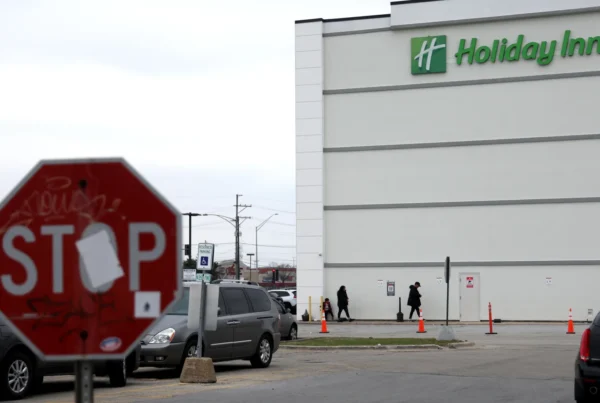By Mark Brown, columnist
Residents of a homeless encampment on Lower Wacker Drive known as the Triangle have been informed they must vacate the site while the city fences it off to prevent their return.
The camp, located beneath Wabash Avenue across the river from Trump Tower, is one of the most visible homeless gatherings in the city with thousands of motorists passing by daily.
It’s also currently one of the Chicago’s largest homeless camps with as many as 45 people sleeping there at night.
Notices posted Friday by the Chicago Department of Transportation say the site will be closed for construction beginning June 11 at 8 a.m.
“They’re serious this time,” said a homeless man on a Trek bicycle who identified himself as Thomas Johnson, 32.
Johnson, who said he has been staying in the Triangle since he was released from prison six months ago, was referring to the occasional cleanings or sweeps during which the homeless people are forced to relocate temporarily.
This time, though, fencing will be erected similar to wrought iron barriers that were added on Lower Wacker by Mayor Richard M. Daley’s administration to block out the homeless and keep them from returning.
“Where are the people gonna go that’s right here?” asked Johnson.

Many of the homeless residents of an area of Lower Wacker Drive known
as the Triangle were still asleep Tuesday morning when the city sent
in a team of social workers to discuss plans to remove them. Many
others scattered temporarily. | Mark Brown/Sun-Times
It’s also currently one of the Chicago’s largest homeless camps with as many as 45 people sleeping there at night.
Johnson knows there is no good answer to that question other than that everyone will do what they have to do to survive, which basically will result in moving the problem to another location.
The Chicago Coalition for the Homeless is planning to protest the city’s decision.
“We believe in homes, not fences. We don’t think it’s an appropriate way to deal with homelessness,” said Diane O’Connell, a lawyer for the coalition.
A CDOT spokeswoman said the department had been asked to install fencing as a safety measure “due to unlawful activities that frequently occur in that area.”

Many of the homeless residents of an area of Lower Wacker Drive known
as the Triangle were still asleep Tuesday morning when the city sent
in a team of social workers to discuss plans to remove them. Many
others scattered temporarily. | Mark Brown/Sun-Times
Chicago Police Department spokesman Anthony Guglielmi said police are concerned about the safety of the homeless people as well as others who live and work in the area.
An array of city social workers were on the scene Tuesday morning to try to connect the homeless people with services and offer to place them in a homeless shelter. But they weren’t getting a friendly reception.
The Triangle is known to harbor a tougher crowd than some other homeless spots. It sometimes appears to function as an open-air drug market, although it’s not always clear who really lives there and who is just passing through.
But most of the homeless people I met there Tuesday morning were non-threatening. They described being on the street for the usual reasons — joblessness, substance abuse, criminal records and combinations thereof.
Rhiannon Gaither, 38, said she has been homeless in the city for four years, even though during most of that time she has worked as a waitress on Michigan Avenue. She lost the job in February.
I asked her why she was out here.
“Heroin,” she said matter-of-factly.
I thanked her for the direct answer, most people in her situation choosing to be more vague.
Gaither said she picked the Triangle over other homeless spots downtown because she has friends there, it’s warmer than other locations, and maybe most important, she’s never seen any rats.
The Triangle was created two decades ago when the city reconfigured Lower Wacker, leaving a triangular shaped area bounded by concrete barriers where Lower South Water Street splits off from Lower Wacker. Unlike most other areas on Lower Wacker, no fencing was erected.

Chris Carter lives in a homeless encampment on Lower Wacker Dr. known as The Triangle. The city plans to evict the people staying
there and to erect fencing to keep them from from returning. | Mark Brown/Sun-Times
Homeless people quickly took advantage, even though it means sleeping alongside the deafening roar of vehicle traffic, and whoever else shows up.
Chris Carter, 50, who grew up in the projects near Comiskey Park, said he stays in the Triangle because “I don’t want to be a burden on anybody else, and I don’t have a place to go.”
Carter said he’ll just move down the street if evicted from the Triangle, but wishes he could get his own apartment like some of his formerly homeless friends.
“If I could get in a situation like that, I could do better,” Carter said.
There is a shortage of situations like that.





